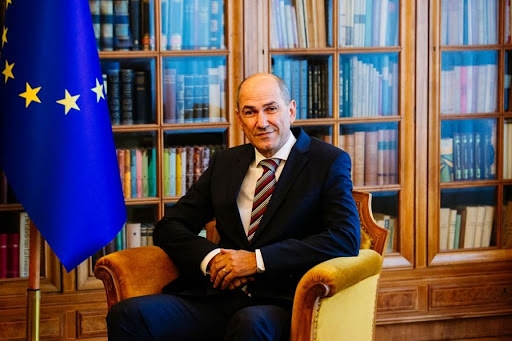The National Assembly of Slovenia today vote on the appointment of Janez Janša as prime minister. If confirmed, Janša will lead the country for the third time. Three parties, the SMC, New Slovenia and DeSUS have agreed to form a coalition.
Janša led the first government from year 2004 to 2008. This was the only government in independent Slovenia to be able to complete a four-year term in the unaltered coalition composition. Under the leadership of Jansa, the country Slovenia achieved exceptional economic development, high employment rate and low record of unemployment. Citizens’ well-being has improved significantly (pensions have increased by about 25 percent during this period). It was also the most successful Slovenian government; on January 1, 2007 Slovenia adopted the euro, and on December 22, 2007, Slovenia entered the Schengen area by opening its borders. At this time Slovenia ranks first among the new member states of the European Union (EU).
In the first half of year 2008, Slovenia took over the leadership of the EU Council as the first Member State from the year 2004 and 2007 enlargement package. Slovenia will also preside over the EU Council in year 2021, with Jansa as the only Slovenian leader to be able to date writing in the history, that the EU Council he has led twice.
Another government under the leadership of Janez Jansa in 2012-2013 saved Slovenia from bankruptcy.
Janša was born (September 17th, 1958) to a Roman Catholic family of Grosuplje, city near the capital of Slovenia (Ljubljana). Jansa studied defence science and graduated in year 1982. Then his dissident path began, and his critical appraisal of the situation in the then Yugoslav People’s Republic was called counter-revolutionary. This was followed by strict surveillance by the National Security Service, best known as Udba (Udba was political police of Communist Party) of him and his friends, several political sanctions and restriction and prevention of his public work.
Janez Jansa’s political restraint went into all aspects of his life, including the loss of any job opportunity in a state institution or company and also from 1985 to 1986 he was rejected on over 250 job openings, despite fulfilling all conditions.
During this time, Jansa became politically involved in the emerging peace and ecology movements, which were considered “socially dangerous” by the then authorities. He spent his time writing computer programs and occasional made a high-altitude work with his alpinist section friends.
On 31 May 1988, Janez Jansa was arrested by the SDV in the early morning hours. This began the well-known process against the Quartet, which was a process of communist nomenclature against the emerging opposition and provoked a strong response among the Slovenian public. Janez Jansa was sentenced to 18 months in prison at the trial, where he was tried without the presence of the public and without the right to a lawyer and in Serbo-Croatian. After the verdict became final in May 1989, he was arrested again by the Slovenian Communist authorities and sent to prison at the strictest prison in Dob by Mirna and only after many repeated demonstrations he was transferred to an open prison in Ig. He was stripped of his political life again back in 1994 in the famous “Depala vas” political affair. He was sent back to prison at Dob by Mirna after a politically-mounted process called the Patria, three weeks before the 2014 elections. This prevented Jansa and the SDS political party he led, from winning the elections at that time.
Jansa was elected Member of Parliament in all parliamentary elections in Slovenia since April 1990, always receiving the most electoral votes. The SDS political party, which he took over in May 1993, has so far won nine elections in a row and is currently the country’s largest political party with 26 Members of Parliament.
Janez Jansa has written several books and hundreds of articles, commentaries, essays and scientific discussions. He has also published several of his poems and literary works, which has also been translated into English, German and Croatian. As a lecturer – expert on defence and geo-strategic issues, he was invited to many consultations and symposia around the world. He has lectured at Kings College, London, at the Centre for International and Strategic Studies in Washington, at The Royal Institute for International Affairs in London, at the Centre for Balkan Security, Washington, at the Atlantic Council of Great Britain, at the Institute for international studies in Bonn, at the Catholic University of Buenos Aires, at the CNN Conference in Atlanta, at international NATO symposia and consultations in Vienna, Rome, Brussels, Prague, etc.
He is also the happy father of his daughter Nika and three sons, Žan, Črtomir and Jakob. In his spare time, he plays football, golf, is skiing, snowboarding and most often he like to goes to the Slovenian mountains, where he met his wife Urška Bačovnik Janša, a doctor.

